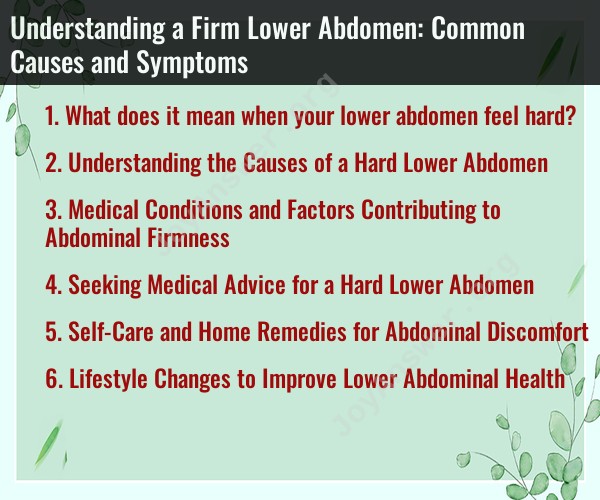What does it mean when your lower abdomen feel hard?
A hard or firm lower abdomen can be associated with various causes, and the meaning or significance of this symptom depends on the underlying factors. It's important to note that a hard or firm lower abdomen should not be ignored, as it can sometimes be a sign of a medical condition that requires attention. Here are some common causes and associated symptoms:
Muscle Tension or Constipation:
- One common and non-serious cause of a firm lower abdomen is muscle tension, bloating, or constipation. These issues can make the abdominal muscles feel tight or hard. You may also experience discomfort, pain, or a sensation of fullness.
Gastrointestinal Issues:
- Gastrointestinal problems like gas, indigestion, or irritable bowel syndrome (IBS) can lead to abdominal discomfort and hardness. These conditions may also cause symptoms like cramping, changes in bowel habits, and diarrhea.
Menstrual Cramps:
- For people who menstruate, menstrual cramps can lead to abdominal discomfort and hardness in the lower abdomen. Cramps are typically associated with the menstrual cycle and may be accompanied by pelvic pain.
Pregnancy:
- In early pregnancy, some individuals may experience abdominal hardness as the uterus begins to expand and change. Later in pregnancy, a hard lower abdomen can be a sign of Braxton Hicks contractions or labor.
Appendicitis:
- Appendicitis is a serious condition in which the appendix becomes inflamed and requires prompt medical attention. A hard and painful lower abdomen, often on the right side, is one of the common symptoms of appendicitis.
Ovarian Cysts or Tumors:
- Ovarian cysts or tumors can sometimes cause a firm lower abdomen, especially if they grow in size. Additional symptoms may include pelvic pain, irregular menstrual cycles, and changes in urination.
Hernia:
- A hernia occurs when an organ or tissue pushes through a weak spot in the abdominal wall. This can lead to a bulge and firmness in the abdomen, often associated with discomfort or pain.
Inflammatory Bowel Disease (IBD):
- Conditions like Crohn's disease and ulcerative colitis, which are forms of IBD, can cause abdominal pain and hardness. These conditions may also lead to changes in bowel habits and diarrhea.
Infections:
- Infections in the abdominal area, such as diverticulitis or urinary tract infections (UTIs), can cause lower abdominal discomfort and firmness.
Cancer:
- In some cases, abdominal firmness may be related to tumors or cancers in the abdominal region. This is less common but may be associated with other symptoms like unexplained weight loss, fatigue, and changes in bowel or bladder habits.
If you're experiencing a hard or firm lower abdomen along with other concerning symptoms, it's crucial to seek medical evaluation and diagnosis. A healthcare provider can perform a physical examination, order tests, and provide appropriate treatment based on the underlying cause. Ignoring persistent abdominal discomfort can lead to delayed diagnosis and treatment of potentially serious conditions.
Understanding the Causes of a Hard Lower Abdomen
A hard lower abdomen can be caused by a variety of factors, including:
- Constipation: Constipation is one of the most common causes of a hard lower abdomen. It occurs when stool builds up in the colon and becomes difficult to pass.
- Gas: Gas can also cause a hard lower abdomen. It can build up in the digestive tract due to eating certain foods, drinking carbonated beverages, or swallowing air.
- Menstruation: During menstruation, the uterus contracts to expel menstrual fluid. This can cause the lower abdomen to feel hard and tender.
- Pregnancy: A growing uterus can put pressure on the organs in the abdomen, causing a hard lower abdomen.
- Urinary retention: Urinary retention is the inability to completely empty the bladder. This can cause the bladder to become full and distended, which can give the lower abdomen a hard feel.
- Abdominal wall strain: Straining the abdominal muscles, such as when lifting a heavy object, can cause a hard lower abdomen.
- Medical conditions: Certain medical conditions, such as irritable bowel syndrome (IBS), inflammatory bowel disease (IBD), and ovarian cysts, can also cause a hard lower abdomen.
Medical Conditions and Factors Contributing to Abdominal Firmness
In addition to the causes listed above, there are a number of medical conditions and factors that can contribute to abdominal firmness, including:
- Ascites: Ascites is a buildup of fluid in the abdomen. It can be caused by a number of medical conditions, including liver disease, heart failure, and cancer.
- Peritonitis: Peritonitis is inflammation of the lining of the abdomen. It can be caused by a number of factors, including infection, injury, and appendicitis.
- Tumors: Tumors in the abdomen can also cause a hard lower abdomen.
- Obesity: Obesity can also contribute to abdominal firmness. This is because excess fat can build up around the abdominal organs.
Seeking Medical Advice for a Hard Lower Abdomen
If you have a hard lower abdomen, it is important to see a doctor to determine the cause. This is especially important if you have other symptoms, such as abdominal pain, fever, nausea, vomiting, or diarrhea.
Self-Care and Home Remedies for Abdominal Discomfort
There are a number of self-care and home remedies that can help to relieve abdominal discomfort, including:
- Drinking plenty of fluids: Staying hydrated can help to soften stool and make it easier to pass.
- Eating a healthy diet: Eating a diet that is high in fiber and low in processed foods can help to improve digestive health.
- Exercising regularly: Exercise can help to improve digestive function and reduce abdominal bloating.
- Applying heat: Applying a heating pad or hot water bottle to the abdomen can help to relax the muscles and relieve pain.
- Taking over-the-counter pain relievers: Over-the-counter pain relievers, such as ibuprofen or acetaminophen, can help to relieve abdominal pain.
Lifestyle Changes to Improve Lower Abdominal Health
There are a number of lifestyle changes that you can make to improve lower abdominal health, including:
- Maintaining a healthy weight: Losing weight if you are overweight or obese can help to reduce abdominal fat and improve digestive health.
- Eating a balanced diet: Eating a diet that is high in fiber and low in processed foods can help to improve digestive health.
- Exercising regularly: Exercise can help to improve digestive function and reduce abdominal bloating.
- Getting enough sleep: Sleep deprivation can disrupt digestive function and lead to abdominal discomfort.
- Managing stress: Stress can trigger digestive problems, such as IBS and IBD. Finding healthy ways to manage stress, such as exercise, relaxation techniques, or spending time in nature, can help to improve digestive health.
If you have any concerns about your abdominal health, be sure to talk to your doctor.













